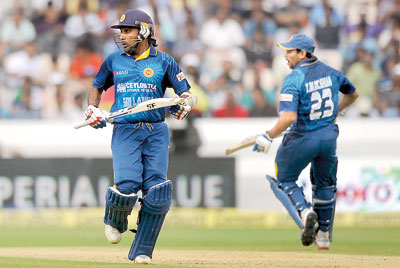Debacle in India: Losing the plot is worse than losing the match
View(s):They say India is the last bastion of cricket. Many a general in the ICC world has tested his cricketing wits there, but often failed miserably.
Prior to this tour of India, Lankan cricket was on a high. Besides a slight setback against South Africa at home, they had accomplished many a deed overseas like winning the Asia Cup and the World T-20 title in Bangladesh, beating England in all forms of the game in their own back yard and shooting down the pride of the Misbah-ul-Haq gang in Tests and ODIs.
From that point onwards, Lankans were gelling on to a pattern where they were looking to the seven ODI series against England in the run-up to the World Cup in New Zealand and Australia three months hence. At that point they had won more matches than they lost by a large margin.
Then that alarm bell rang and woke them up rudely from their short slumber. Every soldier in the billet was pulled out of the bed and sent to the  frontline. Though sleepy, they were supposed to invade India. With their sleepy eyes, they followed orders and took wings to their destiny rather groggily.
frontline. Though sleepy, they were supposed to invade India. With their sleepy eyes, they followed orders and took wings to their destiny rather groggily.
Though battle worthy, the Lankan soldiers were underprepared. On the other hand the Indian cricketing army had just conquered the West Indies who succumbed to an ignominy owing to an internal strife.
For the Sri Lankans this was a catch-22 situation. On the one hand, they were on a serious off-the-field programme – preparing for the near and far future, with a new team management. On the other hand, there was this chance to please the life-line of cricket – India was too much an offer to let go. They had to decide: “Are we prepared to break the training regime which would hold us in good stead for England and or are we going for a monetary gain at the risk of a cricket debacle?”
So they made a compromise…. “Let us make this a chance to blood the youngsters. We could do it in two stages. The final outcome of the tour result is irrelevant”.
However, by the third ODI was completed, the Lankan guns had misfired. Once again it was the old and trusted who kept vigil, the youngsters just kept running on to the Indian yard and getting shot down. It was not a case of losing the match, but it was a case of losing the plot. To any strategist losing the plot is the worst scenario.
In the post-match chat after the third game, Lankan skipper Angelo Mathews confessed, “We made this series to carry out experiments, especially with the World Cup coming up. We are known for the brand of cricket we play and I’m not satisfied by the attitude of the younger players. They have failed to step up as the seniors have done and we expect more from them.
“We were gearing up for a seven-match ODI series against England at home andour target is to peak for that. If someone says that we were underprepared, we would not call it as an excuse for the failures we are going through. As a team we have to take the blame, learn from our mistakes and move forward. I think we were not up to our potential though our performances, particularly of the seniors, striking back. The youngsters have to learn from them.

Mahela Jayawardena and T.M. Dilshan has been carrying the Lankan batting burden on thier shoulders
“In comparison with the Indian team our players were not aggressive enough. That is one area we could have capitalised but unfortunately we failed. We can’t keep going on repeating the same mistakes on an on. We discussed these things at the last meetings as well. We failed twice but were hoping to do better in the third game. But we were not up to it. Besides Mahela (Jayawardena) and (T.M.) Dilshan, others failed to impress at Hyderabad. The youngsters need to step up.”
As a matter of fact, since gaining Test status, Sri Lanka has never won a Test or an ODI series on Indian soil and losing these matches – especially with this kind of preparation — is no news. But, what has to be ascertained is the reluctance of the youngsters to take up arms and fight the battle as they should.
May be within the next six months, the Lankan team will not be able boast of some of the trusted trade mark names that they are identified with. In the shorter version of the game, T.M. Dilshan, Kumar Sangakkara, Mahela Jayawardena and Lasith Malinga would be the heroes of yesterday. It would be the turn of the next generation.
Somehow one does not have to run around the course as if their butts were on fire because of this loss in India. As for the mundane eye, like yours and mine, this is an international series dubbed as the “World Champions vs World Champions”. Intrinsically this is only a cricket sacrifice made at the TV altar.
Once the West Indies series came to a limping halt, the BCCI was obliged to give their TV rights holders a set of match dates so that they would make up for lost dates. They knew if the series title was marketable the Indian public was going to buy it. Nevertheless in reality it was only a cricketing masquerade. Neither side was serious about the tour; nor were they keen on taxing their key players, but, ironically the result goes into record books as a bilateral international cricket series between India and Sri Lanka and the outcome also impacts the ICC official standings.
Coming back to the next generation, there is a huge question mark. Are they ready to take up the challenge?
When Mahela Jayawardena, Kumar Sangakkara and T.M. Dilshan made their debuts they had seniors like the Arjuna Ranatunga, Aravinda de Silva, Hashan Tillekeratne, Sanath Jayasuriya, Marvan Atapattu, Muttiah Muralitharan and Chaminda Vaas to cushion them and give them hope and comfort once in the middle.
But, now that comfort has thinned out. Since the senior lot let go one-by-one along the way, no one has gelled along with the present Lankan trinity. During the last decade or so, there were dozens of players who came into the national dressing room, but failed to make their own corner in it. May be there were some bowlers like Rangana Heath, Lasith Malinga and Nuwan Kulasekera, but, no batsman has staked a claim to his own niche. The only batsman to do yo-yo visits during this time has been Upul Tharanga, but, as long as he is not interested in working on his technical faults, he will be a sitting Lankan duck at the top of the order.
When we asked experts for their opinon, they feel the fault lies in the local cricket structure, which lacks a solid base. At the same time the wickets that they go through season-in season-out are not first class. They are better for plodding rather than stroke making. In bowling even the mere trundlers are among the wickets – thanks to bad and worn-out wickets. In short the present system does not produce batsmen or bowlers of international class.
The administrators are aware of this anomaly, but, they are afraid to bell the cat. Who is the administrator who wants to get voted out at the end of the term by trying to do the right thing?
Are we losing the plot in our international cricket? Mr. Administrator only you have the answer.
| Should the Lankans be overly worried?
Losing to India is not a novel experience. Remember in 2005 in a seven-match series under the captaincy of Marvan Atapattu, the present national coach, Sri Lanka lost to India 6-1 in a seven match series. It was not a makeshift arrangement of this nature, but a fully-fledged series. But, in the first ODI in reply to Indias 350, the Lankans made only 198. Then the last match the Indians romped home with 63 balls to spare. Lankan chief selector Sanath Jayasuriya was also a part of that disastrous tour. But, that was not the end of Lankan cricket. Thereafter the Lankans managed to beat Bangladesh 2-1 in a three match series. Then lost to Pakistan 2-0. Remember in a makeshift tour of India just before the World Cup the Lankans lost to India 2-1 in 2007 But, in the West Indies for the World Cup, Sri Lanka not only saw to that they eliminate India in the first round but, also ended up as the runners-up of the tournament. So Lankan cricket is never a write-off – they believe in the rubber-ball theory.. Another matter to ponder There was an ‘A’ tour of Sri Lanka made by the West Indies. This was a fine opportunity for the Lankans to hone the skills of the younger brood. Yet when you say honing the skills, that does not mean that the selectors are given the license to over harvest. Grooming means you do it in a manner that gives hope and encourage the next in line for the national cap. But, when the selectors plough through 32 players in three ODIs and three 4-day games, it does not serve the purpose. The bowlers do not get a chance to get their rhythm in and the batsmen do not get a chance to settle in. During the next few pages of the calendar the Lankans are to play quite a few ‘A’ level games. But, if the selectors do not trust their younger brood and keep making a ‘pol sambol’ out of the squad it may not be of help. Once again are we losing the plot? No change in Lankan ODI status In spite of losing the series (so far 4-0) Sri Lanka has not lost a single point in the ICC standings. As India is on top of the rankings a loss against them does not add any minus points to the lower ranking side. However the series against England will be important as England trails Sri Lanka by only two points in the ICC rankings. 2014 reads: Team Matches Points Rating As for monetary gain, Sri Lanka did not receive any from this present tour of India. It was only a goodwill gesture. However, India agreed to shift their home 3 Test series against Sri Lanka next August to Sri Lanka. This is where Sri Lanka stands to gain monetary wise. If the Lankans could add a few short version matches into series, they are out for a kill. |


